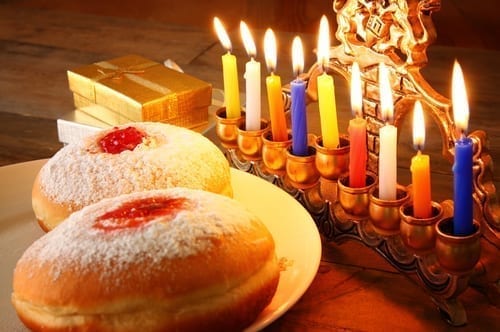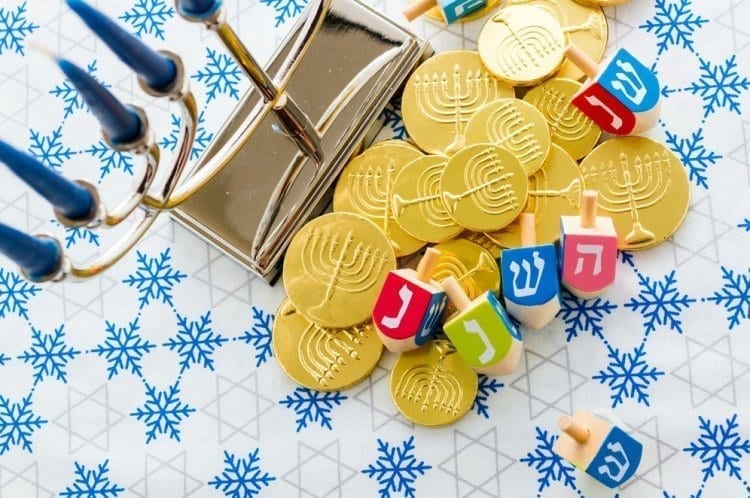This is the time of year when all of the children in Eretz Yisrael are singing “Chanukah, Chanukah, Kol Kach Yaffah” (the Hebrew version of “Chanukah, O Chanukah, a Yom Tov a Sheiner”). Chanukah is a chag of beauty, of yofi. What is beauty’s place in the Jewish world? Does it have a place at all? First, let us define the word “beauty.” It is the knowledge that there is something hidden under the surface that we cannot see—and there is no nation in the world that acknowledges and appreciates this kind of beauty more than am Yisrael. When Yaakov learns that his son Yosef was killed and that Binyamin has been asked to descend to Mitzrayim, he puts his hands up in the air and cries, “I can’t anymore.” He uses the very unique word “kulanah,” saying, “Alai hayu kulanah, all the pain in the world is on my head.” The Bal Haturim gives us a fascinating insight. He explains that the only two places in Tanach where the word “kulanah” is used are in the case of Yaakov, and in Mishlei, where Shlomo Hamelech proclaims in “Eishet Chayil, ” “V’at alit al kulanah—and you, Jewish woman, have the capacity to rise above all the pain in the world.” How does the eishet chayil do this? How can we be the only ones in the world to accomplish this incredible feat of rising above the pain that surrounds us? Because we believe that there’s something beneath the surface that we cannot see. We believe that although we don’t understand everything that happens in our lives, it is still beautiful. If we want to know true beauty, we have to learn to interpret everything that Hakadosh Baruch Hu sends our way in a positive light.

The Sages tell us, “Hachalom holeich achar hapitaron, the dream follows its interpretation.” The way you interpret the dream, the way you interpret your life, is what it will ultimately be. This is precisely the reason for Pharoah’s peculiar choice of wording: “Chalamti chalom u’poter ein oto, I dreamed a frightening dream but I cannot find an interpreter for it.” Following his dream of the seven plump cows who were swallowed by the seven emaciated cows, he did not say, “U’pitaron ein oto, and there is no interpretation,” because that was not the case. On the contrary, his advisors had too many interpretations to offer. One said, “You will give birth to seven daughters and they will all die.” Another offered, “You will conquer seven countries and you will lose them all.” “No, no,” Pharaoh said, “I’m looking for someone who can solve this beautifully, someone who has the ability to see the good in everything. Is there someone out there who can do this for me?” That’s when Yosef came along. Yosef’s name was Tzofnat Panei’ach; he had the ability to reveal that which was hidden. And what did he say? That there would be seven years of plenty and then seven years of famine, and in order to survive, the Egyptians would have to fill up their storehouses ahead of time. So enthusiastic was Pharaoh about Yosef’s interpretation that he chose to crown him viceroy. Why? Because he recognized Yosef’s wisdom; he saw that Yosef understood the importance of looking deeper to find what was hidden under the surface. When Yosef saw seven skinny cows, he looked at what they had swallowed— what abundance they had within.
In order to interpret what’s going on in our lives, we too must look for the beauty, the tzofnat panei’ach. So what is the place of beauty in Judaism? Especially when it comes to Jewish women, we sometimes think that beauty belongs to Yefet, the third son of Noach, the forefather of the Greek nation. Yefet is not like Cham, who is corrupt and immodest, but he’s not Shem either. What is the difference between Shem and Yefet? Both of them go into their father’s room one day to find him drunk and in an immodest state; both want to do something about this unpleasant sight. Shem chooses to cover his father’s shame, while Yefet looks away. Yes, he conducts himself politely, but for whom is he behaving beautifully? For none other than himself, so that he does not have to see that which is not aesthetic. He doesn’t want to see imperfection, but he’s not ready to take measures to make sure others won’t see it either. We, the Jewish nation, are descendants of Shem, whose reward for covering his father is the beautiful article of clothing that our husbands and sons wear—tzitzit. Rashi tells us that Yefet also received a reward for his actions; he was promised that during the future war of Gog and Magog, the fallen bodies of his descendants won’t be abandoned in the battlefields; they will be buried. Yefet didn’t want to gaze at an unpleasant sight and turned his back on it, but Shem and his descendants, klal Yisrael, have an entirely different understanding of why we cover the guf. We don’t cover it because it’s aesthetically displeasing; we do so because it is holy. It’s so beautiful and so full of light that we don’t want to blind the eyes of others. How does Hakadosh Baruch Hu express his appreciation for beauty? By requesting that the keilim in the Mishkan be concealed. Tzniut is about covering what’s precious. “Yaft Elokim l’Yefet v’yishkon b’ohalei Shem, beauty was granted to Yefet, and it will dwell in the tents of Shem.” Let’s understand the words “ohalei Shem.” The Hebrew word “ahil” means a lampshade—something that is placed over a bulb so that people can enjoy the light but not be blinded by its glow.
Without the ahil, the light becomes bothersome instead of pleasant. When the children of Yaakov descended to Mitzrayim, he requested that they all enter through different gates. “Lama titra’u’? You are all so handsome,” he told them. “I don’t want an ayin hara to befall you.” What was Yaakov’s fear of ayin hara? It wasn’t the fear of a non-Jew, who wants to hide his beauty so that others won’t hurt him. Instead, Yaakov’s fear was that the beauty of his sons would hurt others, that those who looked at them would feel imperfect in their presence. When we flaunt our perfection—be it talents, physical beauty, riches, or any gift we were graciously given by Hakadosh Baruch Hu—we are hurting others. We are blinding them with our light. Why should we want to expose all that light? It’s like a high beam that pierces their eyes and distresses them to no end. That was the essence of the Hellenistic culture—to accept nothing less than perfection. If a child born to Greek parents had even a minor handicap, he was immediately eliminated. Unfortunately, this culture has infiltrated our community as well. Parents only want a “perfect” shidduch, and yeshivot and schools want only metzuyanim. Metzuyan is a contraction for the words “matza yavan.” This is what Yavan, our spiritual enemy, was all about. The holy light of Chanukah reminds us what true beauty is. It’s the kind of light people can look at for hours without being hurt. It’s the kind of light that warms their hearts, that draws them closer to Hashem and his Torah because it is so pleasant and accepting. There is so much beauty hidden inside of you, dear Jewish woman, and when you cover that light, it is so very pleasant to look at you. When you emulate the light of Chanukah, when you remember that the gifts you were given are too beautiful to be revealed from under the lampshade, you will merit the koach of “V’at alit al kulanah,” the ability to rise above any pain in the world. Chanukah samei’ach to you all!





